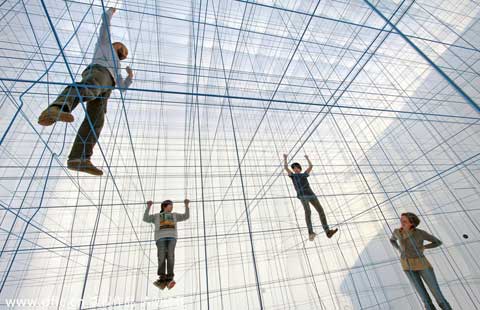Set minds on higher things
Updated: 2014-02-28 07:23
(China Daily)
|
|||||||||||
AT LAST, CLEAR SKY AGAIN AFTER SEVEN smoggy days.
On Wednesday, strong northerly winds along with a cold current swept away the heavy smog that had shrouded most parts of northern and eastern China.
The bright sunshine and clean air has also raised the spirits of residents, lifting them out of their doldrums.
But we should not adopt a "once on shore, we pray no more" mentality when it comes to air pollution, because the smog will soon return once the wind changes direction as the sources of pollution have not been blown away.
The Ministry of Environmental Protection organized inspections of 12 heavily polluted cities during the past week to check how well the local governments were implementing the State Council's 10-article rules on air pollution control.
They were disappointed to find that in North China's six most polluted cities - Beijing, Dezhou, Tianjin, Xingtai, Zhengzhou and Shijizhuang - more than 60 plants were violating environmental protection rules by discharging pollutants or emitting toxic gases. In Tangshan city in Hebei province, 34 of the 46 plants they inspected had environmental problems.
Worse, some plants even possess the equipment necessary to treat the pollutants they discharge, but they never use them since doing so would increase their operating costs. While some plants that should have been closed because of their outdated production facilities are still in operation.
Even more worrying, most local environmental protection watchdogs play hardly any role in overseeing and checking polluting enterprises, and many devices installed to monitor the discharge of pollutants do not work at all.
Despite the resolve to deal with pollution and transform the mode of development the top authorities have displayed, it will clearly take much longer than expected for their resolve and the State Council rules to be turned into real action at the local level.
Most local governments turn a blind eye and deaf ear to the violations of environmental rules by the enterprises under their auspice. They're afraid of losing revenue from them and hikes in unemployment if they close them or force them to renovate their production facilities.
Without breaking the barrier of local protectionism, we can hardly expect that the blue-sky days will last long.
Without changing the mindset of local leaders so they focus on sustainability, we see no hope of the air quality taking a real turn for the better in the near future.
(China Daily 02/28/2014 page8)
Today's Top News
US senators scold Swiss bank in tax spat
New Ukraine ministers proposed
Guitarist Paco de Lucia dies
Ukraine disbands riot police unit
Russian troops on alert in drill
Construction of China-Russia railway bridge starts
Turks stage protests demand PM's resignation
Forecast:China to lower growth rate
Hot Topics
Lunar probe , China growth forecasts, Emission rules get tougher, China seen through 'colored lens', International board,
Editor's Picks

|

|

|

|

|

|





